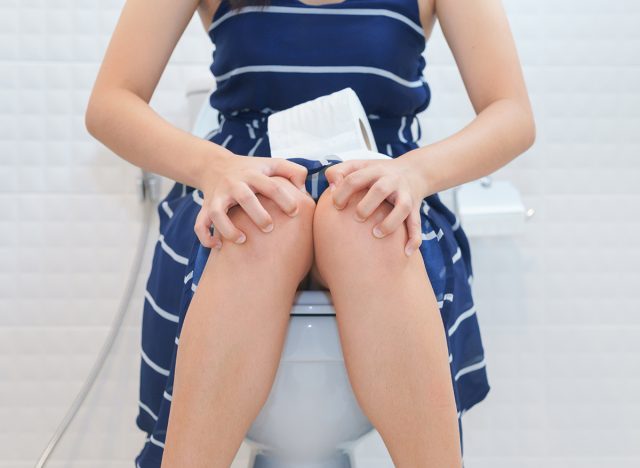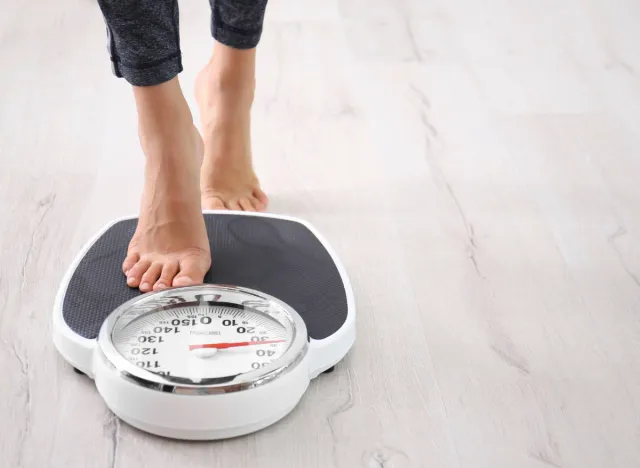More and more, research shows that the gut is a mastermind behind numerous areas of health. Everything from diabetes risk to mental health appears to be affected by the state of the trillions of microbes that inhabit our digestive tracts. For good or for ill, this ecosystem of tiny organisms, referred to as the gut microbiome, holds serious power over our well-being. Knowing this is excellent motivation to keep our guts as happy as possible with strategies like eating fermented foods, getting plenty of sleep, and dialing back our stress levels.
Sometimes, though, we all may experience an out-of-whack balance of gut bacteria, which is known in the scientific world as dysbiosis. This shows up, of course, in digestive symptoms, but may also present in other ways, too.
Watch for these 10 warning signs your gut health is off—and talk to your doctor if any of them persist.
You're constipated.

No shocker here. When your gut health is off, you may notice a slowdown of bowel movement.
According to 2022 research in the journal Nutrients, the microbiome directly influences gut movement (or lack thereof). Fortunately, though microbial imbalance can cause constipation, restoring balance can alleviate it. The researchers behind this study concluded that the right probiotics act upon the immune and nervous systems to improve intestinal function. Your healthcare provider can help you determine which probiotic strain is right for getting things moving again.
You're having diarrhea.
Not every gut imbalance results in constipation. Sometimes—and perhaps more frequently—you may experience the opposite problem. Diarrhea is a classic harbinger of dysbiosis. When your colony of gut microbiota isn't thriving, it can't do its best work of warding off invading pathogens like harmful bacteria, fungi, and viruses that cause diarrhea.
The good news is that studies have shown promise for treating both chronic and acute diarrhea with the right probiotics.
You're having heartburn.
When things are off in your lower gut, problems can creep into your upper GI tract. Heartburn may be a sign of poor intestinal health. In a 2021 study, patients referred for anti-reflux surgery had an extremely high prevalence of gut dysbiosis: 60.6%! Other research indicates that people with acid reflux have an unusually high levels of gram-negative bacteria in the esophagus.
You're having skin problems.
Can gut troubles show up on your skin? They sure can. The so-called "gut-skin axis" refers to the interplay between intestinal and skin health. According to 2021 research in Microorganisms, an unbalanced microbiome is associated with an altered immune response that can cause acne, atopic dermatitis, psoriasis, dandruff, and skin cancer.
You've developed food sensitivities or intolerances.

Can't seem to tolerate certain foods the way you used to? Your gut health could be at the root of the problem. The connection between food sensitivities and the microbiome is a complicated dance that researchers believe involves the immune response. Though sensitivities or intolerances may persist for life, some, like lactose intolerance, could be mitigated by treatment with probiotics.
You're fatigued.
Research has long shown a potential link between chronic fatigue conditions and diminished gut health—but even young, fit adults could experience fatigue if their gut health is off, according to a 2022 study in Nutrients. That said, further research is needed to pin down the exact link between fatigue and the microbiome.
You're having stomach pain.
It's the sign we immediately associate with something wrong in the gut: pain. Though belly pain can have a variety of causes, it's often a clear indicator that bad bacteria are gaining ground in your gut. People with functional gastrointestinal disorders like irritable bowel syndrome (IBS) and functional dyspepsia (FD) often experience stomach pain—and a dysregulated microbiome may be to blame.
You're gaining weight.

We don't yet know all the ins and outs of how an off-kilter gut promotes weight gain, but it's clear that the bacteria in our bellies influence the number on the scale. Research from 2020 in Preventative Nutrition and Food Science reports that the microbiome impacts nutrient metabolism and energy expenditure—two major components of weight management. On the other hand, a healthy, diverse gut colony is associated with weight loss.
You're bloated.
Though flatulence is actually a normal expression of a healthy GI tract, it's not normal to feel uncomfortably bloated all the time. Excessive bloating could be the result of small intestinal bacterial overgrowth (SIBO) or IBS. If your belly is regularly tight as a drum, it's probably time to see your doctor about tending to your gut health.
You're sleeping badly.
Poor sleep and gut health sometimes get caught up together in a vicious cycle. Sleeping badly can negatively impact the microbiome—which in turn causes more sleep deprivation. Fortunately, the opposite also appears to be true. People who get better sleep tend to have greater microbiome diversity. Creating a healthy sleep hygiene routine could help you not only get better shuteye but boost your gut health as well.
No comments:
Post a Comment